The civil war in the Labour Party is at a critical stage, writes Carla Roberts
What do these four jokes have in common?
1. Here are the rules of being Jewish, as I understand them. Thou shall not kill. Thou shall not commit adultery. Don’t eat pork. What was that last one? Don’t question it, God has spoken. Really, has he? Or is it just pigs trying to outsmart everybody?
2. I’ve often wondered that if I grew up in Poland when Hitler came to power and I was sent to a concentration camp, would I still be checking out women? I think I would – “Hey, Shlomo, did you see that one by Barracks Eight? I’ve had my eye on her for weeks. I’d like to go up and say something to her. ‘How’s it going? They treating you OK?’ Of course, the problem is there are no good opening lines in a concentration camp.
3. People think that Ebenezer Scrooge is Jewish … well, he’s not. But all three Stooges are.
4. Jewish Voice For Labour is calling for disciplinary hearings to be paused until a due process has been established, based on principles of natural justice. What I call Jew process … Seriously, one of the things that does worry me is the privileging of racism against Jews, over and above – as more worthy of resources than other forms of racism. That’s bad for the many – as well as bad for the Jews.
No doubt you know the answer. They have all been told – or sung – by Jewish people: Jon Stewart, Larry David, Adam Sandler in his ever-evolving Chanukah song, and, last but not least, Wirral councillor Jo Bird, who has just been suspended for her remarks after the Jewish Chronicle ‘exposed’ her joke, made at a meeting in support of Marc Wadsworth 10 months ago.
We could quote plenty more Jews poking fun at Jews, of course, starting with Woody Allen’s films Hannah and her sisters (which is all about his Jewish character having a spiritual crisis, exploring other religions) and Annie Hall (in which he imagines being a Hasidic Jew and in a split screen takes the mick both out of dinner time at a secular and an Orthodox Jewish household). Or how about Sacha Baron Cohen dressing up as Borat from Kazakhstan, singing in front of a bar of clapping and cheering Americans: “Throw the Jew down the well, so my country can be free. You must grab him by his horns, then we can have a big party.”
In his book Jokes and their relation to the unconscious, Sigmund Freund famously considered Jewish humour unique, in that it is primarily derived from self-critical mocking of the in-group (Jews) rather than the ‘other’. Or, in other words, they are self-deprecating jokes. There are dozens of modern books analysing the best Jewish jokes. A couple of years back, the Jewish Chronicle printed “the greatest Jew joke” of all time, told by Jerry Seinfeld:
Two gentile businessmen meet on the street. One of them says, ‘How’s business?’
The other one says, ‘Great!’
Apparently, this joke “confounded his hosts and audience members alike”. But: “Here at the JC we think we know why it’s funny.”
Is it because Jerry Seinfeld is not a member of the Labour Party? Otherwise he would be a raving anti-Semite, taking the piss, as he does, out of Jews being good at business and arguing at length about it (and everything else).
Would the Chronicle still dare to print this today? Or an article with the headline, ‘Jew know why we love Annie Hall?’ Who knows? But they certainly felt the need to claim outrage over Jo Bird’s remarks – with, of course, the now obligatory comment by Rachel Riley of Countdown fame. The TV presenter is particularly enraged by Jo Bird’s efforts to humorously ‘update’ the famous poem by pastor Niemöller: “Absolutely aghast listening to JVL’s Jo Bird. Take a poem about the holocaust, remove the Jews, to replace them with persecution of anti-racists and anti-Zionists.”
The Jewish Chronicle echoes her ahistorical outrage by complaining:
In her version, the poem no longer features the famous “First they came for the Jews” line, which instead is replaced by Ms Bird with “Then they came for the anti-Zionists. They came for the socialists, but they couldn’t get us because we were having a party, the Labour Party,” she says, to loud applause and laughter.
This is actually quite ironic, because Niemöller’s original poem does not start with Jews. In fact, the version “authorised” by Niemöller (according to the Martin Niemöller Foundation) does not feature Jews at all. This is the verified version of the part of the speech that he first gave around 1946:
“Als die Nazis die Kommunisten holten, habe ich geschwiegen; ich war ja kein Kommunist.
Als sie die Sozialdemokraten einsperrten, habe ich geschwiegen; ich war ja kein Sozialdemokrat.
Als sie die Gewerkschafter holten, habe ich geschwiegen; ich war ja kein Gewerkschafter.
Als sie mich holten, gab es keinen mehr, der protestieren konnte.”
Communists, social democrats and trade unionists – nobody else. The Martin Niemöller Foundation, which has gone to great lengths to historically examine the quote, laments how “the quote is still frequently being used and modified rather carelessly, which explains its ongoing popularity”.
If Jo Bird’s modification of the poem proves that she is anti-Semitic, then surely the same applies not just to the Jewish Chronicle, but pretty much everybody on the planet who has ever used the quote.
As an aside, Niemöller is a funny one for Zionists to laud. When he was asked in the 1960s why his original poem had not listed Jews, the foundation explains how he described how “he couldn’t have listed the Jews: he was already interned in a concentration camp when the biggest persecution waves took place”. Niemöller was first interned in the Sachsenhausen camp in 1937. He was later moved to Dachau and only released at the end of the war in 1945. True, the Reichskristallnacht of November 9 1938 is often seen as the key moment in the persecution of Jews in Germany, when 30,000 Jews were interned, hundreds murdered and thousands of shops and houses smashed up, while the police watched on. But, of course, Jews were already suffering extreme oppression before 1938. But Niemöller openly stated that – compared to the prosecution of communists, social democrats and trade unionists – the prosecution of Jews simply did not feature on his radar.
This does reflect in part how history has been rewritten after World War II (along with the poem) to wrongly portray Jews as the main and often only target of the Nazis. But it also reflects Niemöller’s own rightwing politics. He was in fact an enthusiastic supporter of the Nazi takeover in 1933 and remained one for years. He shared much of the common and widespread anti-Semitism at the time. In 1935 – the year Jews had their citizenship rights taken away by the Nürnberger Gesetze – he gave a rather shocking sermon on the occasion of Israelsonntag:
“We speak of the eternal Jew and see the picture of a restless wanderer, who has no homeland and cannot find peace; and we see the picture of a highly talented people that produces idea after idea designed to delight the world; but whatever it starts turns into poison and what it reaps is always contempt and hate, as the deceived world recognises the fraud and takes its revenge ‘in its own way’. ‘In its own way’, because we know very well that there is no licence that empowers us to help along God’s curse with our own hatred … ‘Love thy enemy’ does not allow for any exceptions.”
He was certainly no friend of Jews – and you can just imagine what kind of criticism the Niemöller of 1935 would face today. But the fact that he is still held in such esteem by Zionists underlines the fantastic success of their efforts to rewrite history.
Chris Williamson
Jo Bird’s suspension follows hot on the heels of Chris Williamson’s. Both suspensions are so utterly ridiculous and without any rational foundation that you do wonder if Iain McNicol has not sneaked back into the general secretary’s office. Certainly it seems that the ‘honeymoon period’, when it comes to the long overdue reform of the disciplinary process, is at an end. For example, as demanded by the Chakrabarti report, automatic suspensions had stopped. Instead, members retained their membership rights while the investigation into their case was ongoing. Do Williamson and Bird really pose such a threat to other members that they have to be prevented from attending Labour meetings? Of course not.
Their suspensions are unfortunately yet more evidence of how incredibly successful the right has been in its campaign against the left in the party. We hear from a number of sources that Jeremy Corbyn did indeed try to stop Chris Williamson’s suspension, but that he and general secretary Jennie Formby came under immense pressure – and sadly, not just from the right, but also his (former?) allies, John McDonnell and Momentum owner Jon Lansman, both of whom have been publicly leading the campaign to continuously appease the right over the anti-Semitism smear campaign. A day after Williamson was suspended, Momentum circulated a scabby ‘Anti-Semitism open letter’, which was clearly drafted in response to Williamson’s remarks – made, ironically, at a meeting of Momentum’s Sheffield branch. He was suspended for having said:
The party that has done more to stand up to racism is now being demonised as a racist, bigoted party. I have got to say, I think our party’s response has been partly responsible for that, because in my opinion … we’ve backed off far too much, we have given too much ground, we’ve been too apologetic … We’ve done more to address the scourge of anti-Semitism than any other party.
How could anyone interpret this as downplaying the necessity to oppose anti-Semitism? However, the phrasing of the Momentum letter, although Williamson was not named, seemed to echo some of his vocabulary, with the meaning reversed:
We recognise that as a movement we have been too slow to acknowledge this problem, too tolerant of the existence of anti-Semitic views within our ranks, too defensive and too eager to downplay it. We sincerely apologise to the Jewish community, and our Jewish comrades in the party, for our collective failure on this issue to date.
This has Jon Lansman’s fingerprints all over it. It has been signed by about 1,000 people (though we have heard of complaints that people were signed up without their consent, while others featured numerous times). In any case, that figure has been dwarfed by the numbers who have signed open letters and petitions in support of Chris (for example here and here)- and those demanding the removal of Tom Watson as deputy leader of the Labour Party (which has close to 20,000 signatories). Even the petition demanding that “Momentum must ditch Jon Lansman” has almost 800 signatories.
Another Corbyn supporter to have come under fire in the last few days is Darren Williams, one of the few actual leftwingers on Labour’s national executive committee. As secretary of Welsh Labour Grassroots, he distributed the organisation’s statement defending Chris Williamson. Stephen Kinnock MP has demanded that Williams should be suspended, “because political interference in political disputes [!] is not allowed”. We presume Kinnock, who clearly is not the sharpest tool in the box, meant to say ‘disciplinary disputes’, but he would still be wrong.
He is apparently referring to the much-quoted “instruction” said to have been recently circulated by Labour HQ, in which “Labour’s general secretary, Jennie Formby, has warned constituency parties, the NEC and other Labour Party bodies that disciplinary cases against individuals are confidential and should not be discussed”. Or so the BBC reports.
It appears, however, that an overly keen London regional organiser took it upon herself to copy a paragraph from an old email of Formby’s and send it out as “recent advice”. This was then picked up by Labour List and has since been distributed, uncritically and without any comment, by some other regional officers – and, sadly, by the Campaign for Labour Party Democracy (which is run by Pete Willsman, who was himself falsely accused of playing down anti-Semitism).
Labour Against the Witchhunt reports that it has been in touch with “at least a dozen” branch and CLP secretaries who did not receive any advice from Jennie Formby or their regional officers. Of course, should anybody phone Labour HQ, they would probably be told that this is indeed the current advice. But this is rather different from Jennie Formby sending out an email in response to the widespread anger over Chris Williamson’s suspension. And in any case, it it is still only ‘advice’.
Comrade Williamson is enormously popular in the party – his ‘Democracy Roadshow’ in favour of mandatory reselection and other democratic reforms has brought him into close contact with thousands of members up and down the country. Having undergone quite a dramatic political transformation from Blairite to Corbynista, he is now the only MP who still dares to speak out in defence of the many members who have been suspended and expelled on trumped-up charges of anti-Semitism or ‘bringing the party into disrepute’.
As I have pointed out, thousands signed petitions and open letters within days of his suspension. We know of six CLPs that have issued public resolutions condemning the decision (and we know of a couple of others who decided not to publish their resolutions after the media shitstorm hit Hackney North CLP). In many more branches and CLPs, members have tried to put motions forward, but were prevented by their chair, who said they could not be “allowed”.
This is the actual quote from Jennie Formby, which was, we believe, sent out in relation to Marc Wadsworth’s suspension and subsequent expulsion from the Labour Party in April last year:
Please note that individual disciplinary cases that are being dealt with through the NEC disputes processes are confidential. Motions on individual cases are therefore not competent business for discussion at CLPs and will not be discussed by the NEC or any associated bodies.
Even if this had been new advice given out by Formby, we would still make the following points about it. Firstly, the suspensions of both comrades Williamson and Bird have been publicised by every British news outlet, with rightwing MPs falling over themselves to make their outrage heard. The cases have not been treated as “confidential” by those who have leaked the news and have thereby quite clearly become “competent business” for branches and CLPs to discuss.
Sure, the NEC might not discuss such resolutions. But it is pretty doubtful if that body, meeting every two months for a few compressed hours, spends much time discussing any branch and CLP resolution. On the other hand, every resolution and statement published that speaks out against the witch-hunt in the party adds an enormous amount to the political pressure on Labour HQ.
In any case, it is always up to the members of any Labour Party meeting to decide what should be discussed and which motions should be voted on. LAW has published useful information on how to move a motion or emergency motion and what to do if your chair refuses to table it. Comrades should not be intimidated by this attempt to silence them.
Lord Falconer
The formation of the Independent Group and Tom Watson’s efforts to put together a merry band of Blairite MPs have played a huge role in the suspensions of Chris Williamson and Jo Bird (as they did in the apparent decision to delay the publication of guidelines on trigger ballots – which is the only way local members can get rid of their rightwing, anti-Corbyn MPs).
The civil war in the Labour Party has reached a critical point and the case of Williamson in particular is of extreme importance. Whichever way the decision on his disciplinary case goes, it will have huge implications: should he be cleared, we can expect more rightwing MPs to walk, amid yet more accusations of “institutional anti-Semitism”. But, should he be expelled, that would do huge damage to the ‘Corbyn project’ and would no doubt lead to massive demoralisation among Labour members (the majority of whom joined to support the leftwing politics of Jeremy Corbyn). Expelling Williamson would be a dramatic symbol of the victory of the right over the left. It would also represent a massive defeat for Corbyn himself. The next attempted coup against Corbyn will happen before long – but how many people will still be left in the party to fight his corner or vote for him?
Unfortunately, the Labour leadership still does not seem to grasp this pretty basic reality, despite the fact that the civil war is currently being played out in branches up and down the country. What else shall we make of the attempt to appoint Lord Falconer to lead yet another inquiry on anti-Semitism? As an attempt to put a lid on the anti-Semitism ‘scandal’, it has backfired rather spectacularly – and deservedly so.
The mere fact that there will be another inquiry plays straight into the hands of the right, who have been saying all along that Corbyn and Formby are incapable of understanding even what anti-Semitism is and that their disciplinary process therefore cannot be relied upon.
It seems the main qualification for the job of leading the inquiry is that the candidate must be a rightwinger. Lord Falconer certainly seems to tick a few boxes there: he is an arch-Blairite, was a member of his former flatmate’s war cabinet and even provided the legal advice that was used to take Britain into war against Iraq. His legal advice was also used in moves to destroy the National Union of Mineworkers. In an interview with The Sunday Times (March 3 2019), Falconer went out of his way to show that he was the right man to see off the left:
The most frightening thing is the profound and almost universal sense within the Jewish community that the Labour Party and Jeremy Corbyn are anti-Semitic. They feel they are not safe … because the potential prime minister and the main opposition party are anti-Semitic.
Well, that certainly does not sound like he has much of an open mind on the matter. And what exactly is “the Jewish community” that apparently feels unsafe in the Labour Party? There is no such thing, of course. There are pro-Zionist Jews and anti-Zionist Jews – and that is just for starters.
Falconer also promised to reopen investigations into “stone-cold cases” of anti-Semitism, including allegations made by pro-Zionist MP Louise Ellman against leftwing members in Liverpool Riverside.
But nothing Corbyn and Formby can do now is considered good enough in the ever-growing campaign to equate anti-Zionism with anti-Semitism. So we hear from the usual suspects like Margaret Hodge and Ruth Smeeth that Falconer is unacceptable, because he is a member of the party. Only a really “independent person” could lead such an inquiry … We presume they mean somebody as ‘independent’ as those running the Jewish Board of Deputies, the organisation that organised the anti-Corbyn ‘Enough is Enough’ demonstration outside parliament.
The current civil war can be resolved in only one of two ways: either the left or the right will win. Muddling on for the sake of some sort of ‘unity’ will not remain an option for much longer – even for Jeremy Corbyn.
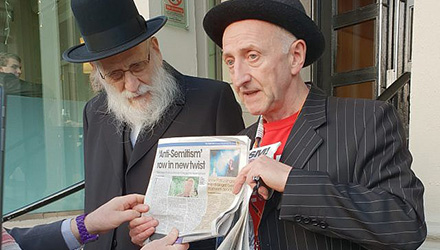
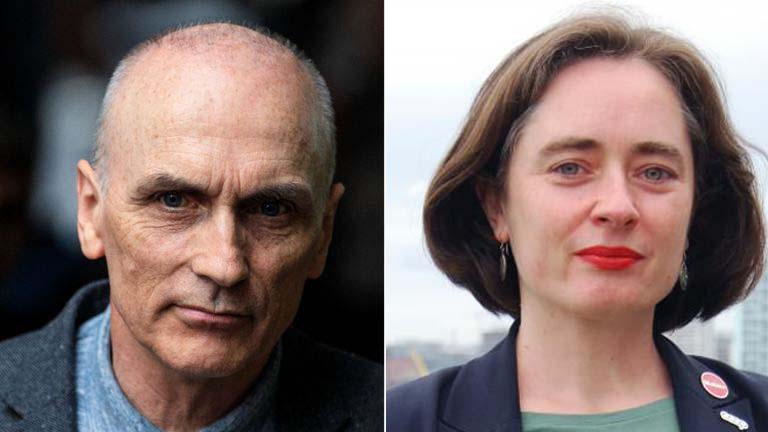
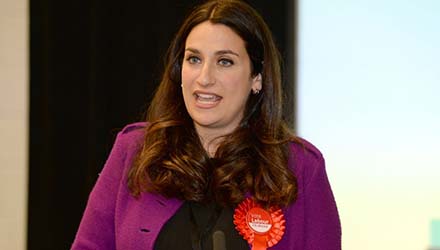

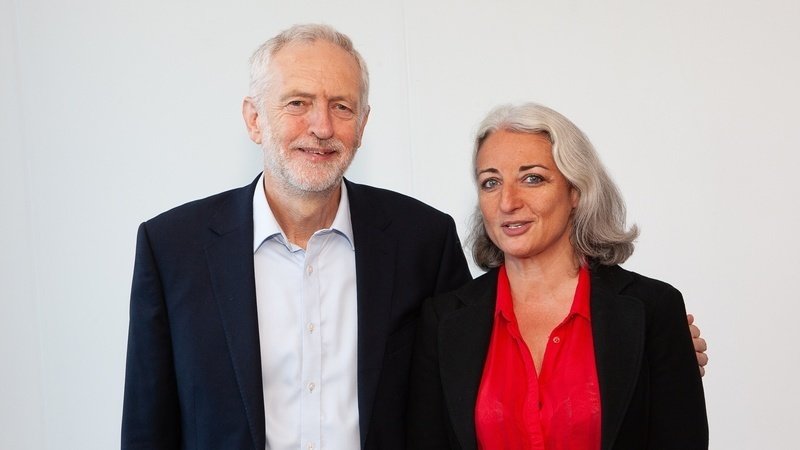
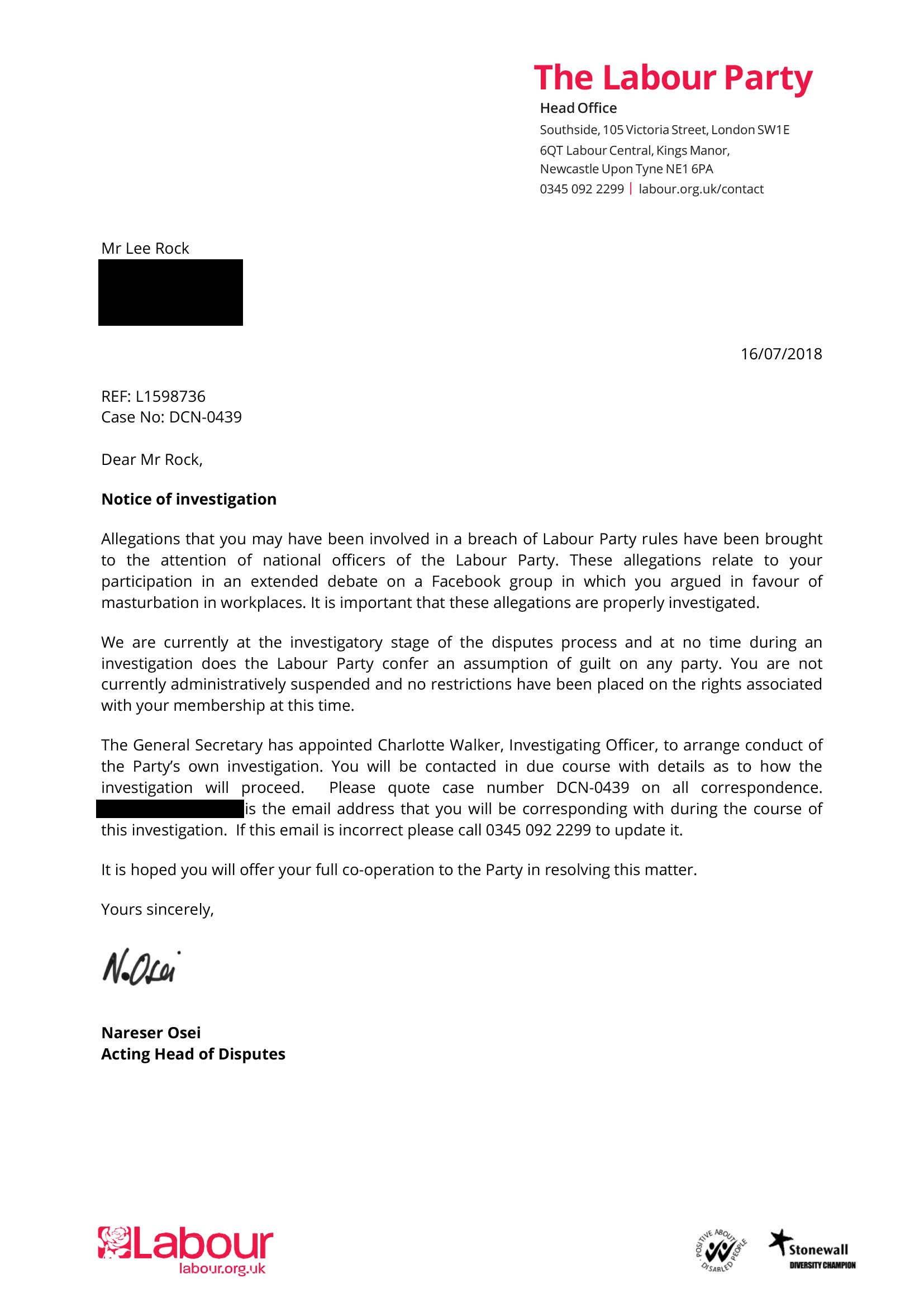

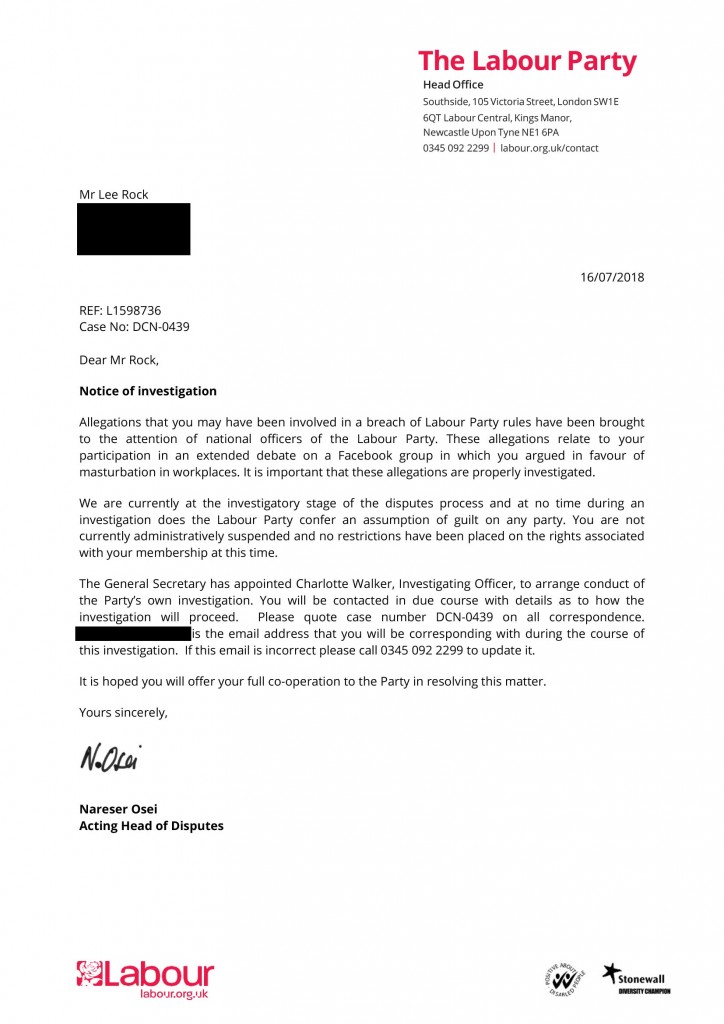 Yes, you read that correctly. That is the sole and only charge raised against comrade Rock. He has not (yet) been suspended or expelled, but is being warned that the allegations are currently being investigated.
Yes, you read that correctly. That is the sole and only charge raised against comrade Rock. He has not (yet) been suspended or expelled, but is being warned that the allegations are currently being investigated.